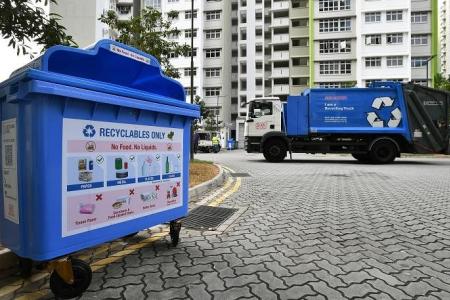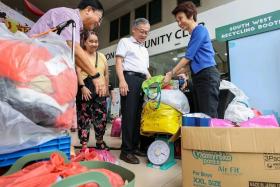Recycling remains an issue as recycling rate stalls
The household recycling rate in 2023 stagnated at its lowest point in over a decade, with just 12 per cent of all rubbish thrown out recycled – the same as in 2022.
The low recycling rate in 2023 comes even as households threw out less waste that year. In 2023, each person in Singapore threw out 0.88kg of rubbish a day, down from the 0.9kg generated per person per day in 2022, and the 1.08kg figure in 2013.
Singapore’s domestic recycling rates typically hover around 20 per cent, but fell to an all-time low in 2022 because less paper, cardboard, textile and leather were exported for recycling.
The National Environment Agency (NEA) revealed the waste statistics for 2023 on June 19, on the sidelines of the CleanEnviro Summit Singapore sustainability conference.
The low domestic recycling rate comes despite findings from an NEA survey in 2023 which showed that 72 per cent of households recycled, up from 64 per cent in 2021.
Conducted from April to June 2023, the survey of 2,180 respondents also found that 89 per cent of respondents were aware that common items such as rinsed shampoo or detergent bottles can be deposited into recycling bins and chutes, up from 71 per cent in 2021.
Still, having more households participate in recycling did not translate to an increased recycling rate in 2023.
Contamination remains a major challenge for domestic recycling in Singapore. When non-recyclables such as food are thrown into the commingled recycling bins, they contaminate the lot, which must be thrown out. The NEA estimates the contamination rate of domestic recyclables to be about 40 per cent.
Speaking at the joint opening of the 2024 Singapore International Water Week and the CleanEnviro Summit Singapore, Minister for Sustainability and the Environment Grace Fu said that as Singapore’s domestic recycling market is small, the Republic is reliant on other countries offtaking its recyclables. This depends on factors such as freight costs and commodity prices, she said.
But Ms Fu added that there has been a heartening shift towards “reduce” and “reuse”.
“Despite steady growth in Singapore’s population and economy, domestic waste generated per capita has dropped by more than 15 per cent over the past decade, while non-domestic waste generated per dollar gross domestic product has dropped by 30 per cent over the same period,” she added.
Overall, the domestic and non-domestic sectors in Singapore generated about 6.86 million tonnes of waste in 2023 – 7 per cent lower than the 7.39 million tonnes produced in 2022.
Domestic waste refers to waste generated from households, shophouses, petrol stations, hawker centres, educational institutions and places of worship. The non-domestic sector includes commercial and industrial premises.
The NEA said the lower amount of waste generated indicated that households and companies have taken positive steps to reduce and reuse.
Recycling, however, remains a perennial challenge for the Republic. Under the Singapore Green Plan 2030, a national blueprint that sets out sustainability targets, the nation aims to achieve a 70 per cent overall recycling rate by 2030.
But the overall recycling rate – which includes figures from both domestic and non-domestic sectors – in 2023 was 52 per cent. This is down from the 57 per cent overall domestic recycling rate in 2022.
The NEA said the drop was due to the “significant decrease” in the amount of construction and demolition waste collected from commercial premises such as factories and construction sites.
Construction and demolition waste – a key industrial waste stream that is generated in large amounts – decreased by more than 40 per cent in 2023 compared with 2022, because there were fewer demolition projects.
Significant year-on-year variations in the volume of construction and demolition waste would thus result in huge fluctuations of the non-domestic and overall recycling rates, NEA added.
Get The New Paper on your phone with the free TNP app. Download from the Apple App Store or Google Play Store now


